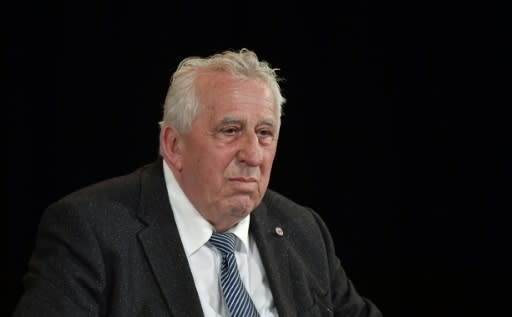East Germany's Egon Krenz, the 'incorrigible comrade'
East Germany's last hardline communist leader, Egon Krenz, would like to set the historical record straight: the Berlin Wall did not fall on November 9, 1989. Now aged 82, Krenz, an unrepentant defender of the vanished Soviet-allied state, is back in the news as a united Germany prepares to celebrate 30 years since the historic event. When East German border guards first opened the gates to a flood of people that November day, "no-one from the eastern side went to the wall with tools to tear it down!", he has repeatedly stressed. "No-one called it the fall of the Wall back then," Krenz said at the recent Berlin launch of his latest book "We and the Russians". He insists, despite evidence to the contrary, that the standard phrase is an "ideological term" invented later. Krenz has long dismissed as "victor's justice" and "political persecution" his post-reunification jail term of over six years for the regime's shoot-to-kill policy against those trying to flee it. In this anniversary year, he has also called for a bit more gratitude for the German Democratic Republic (GDR), which he briefly presided over before it disappeared. The most notable point was that "no shot was fired," he told the Frankfurter Allgemeine Zeitung daily. "That champagne flowed that evening and not blood, that is not the legacy of Chancellor (Helmut) Kohl, that is the legacy of the GDR!" - 'Why such big teeth?' - A classic Eastern bloc party soldier, Krenz rose through the youth wing of the Socialist Unity Party of Germany (SED), served in the army, studied in Moscow, held top posts in security and propaganda and finally entered the powerful politburo -- the centre of political power. He was long considered the crown prince to his mentor, veteran leader Erich Honecker, and succeeded him as head of state and party leader in 1989. Britain's Independent newspaper has judged that Krenz, having risen through the one-party system "like gas in a stagnant pond", ironically "got to the top just as the party was over". It fell to Krenz in the turbulent days of 1989, as peaceful street protests rocked the detested Soviet-backed regime, to take the helm as the youngest general secretary of the ruling party. Taking over on October 18, he promised democratic reforms to match the glasnost and perestroika policies of Soviet leader Mikhail Gorbachev. But his reassurances inspired little confidence with protesters who had heard him describe as "restoring order" communist China's Tiananmen Square massacre in June of that year. A famous protest placard portrayed Krenz as the wolf from the "Little Red Riding Hood" fairytale, lying in bed with a toothy grin, with the words "Grandmother, why do you have such big teeth?" - 'Unlucky crown prince' - Krenz, facing a spiralling economic crisis, was soon abandoned by patron Moscow. He was powerless to stop the collapse of the state apparatus less than a month after taking office. In the end, people power consigned the regime to history and swept away Krenz, who was pushed out of the SED hierarchy in December 1989. Within less than a year the police state had vanished with Germany's national reunification of October 1990. To an extent, Krenz himself had accelerated the GDR's collapse when he asked a member of the central committee to prepare to announce the liberalisation of travel abroad. It was Berlin party boss Guenter Schabowski's clumsy delivery at a November 9 press conference that sent huge crowds surging to Berlin border points, where overwhelmed guards eventually relented and opened the gates. To historians, Krenz is a tragic Cold War figure, an "unlucky crown prince," said Stefan Bollinger, political scientist at Berlin's Free University. "He came to power too late and was too inconsistent to have any real influence on the course of history." - 'Ostalgie' champion - In 1997, a Berlin court sentenced Krenz to six and a half years prison, finding that he shared responsibility for the deaths of at least four people who had tried to escape to the West between 1984 and 1989. After multiple appeals, Krenz served just under four years behind bars from 2000. After his early release in late 2003, he retired to the small town of Dierhagen on the Baltic Sea coast. He soon returned to public life, with speeches that defended politics in the vanished country, making him a standard-bearer for "Ostalgie" -- a play on words for nostalgia about the former country called Ostdeutschland. The Berliner Zeitung daily once labelled him the "incorrigible comrade". In his book "Prison Notes", Krenz wrote of his hope that future generations would want to rediscover truths about the GDR, instead of "totally condemning" the country and "marginalising those who have defended it". The German Democratic Republic's (GDR) last communist leader, Egon Krenz, makes no apologies for his record Krenz was jailed for four years for his responsibility in the deaths of at least four people who tried to cross from East to West Germany during the Cold War



